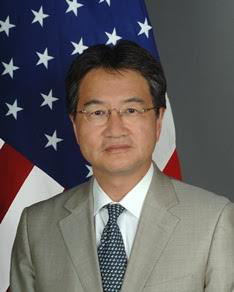On May 16, Joseph Y. Yun, the ambassador and U.S. special representative for North Korea policy and deputy assistant secretary for Korea and Japan in the Bureau of East Asian and Pacific Affairs, came to Portland State to discuss North Korea’s nuclear arsenal and what can be done to manage its unpredictable regime and nuclear threat.
Yun’s lecture, “Dealing with a Nuclear North Korea,” was part of the Asia Diplomat Lecture Series. He spoke of the underlying issues and concerns with North Korea, the ultimate goal in dealing with nuclear weapons, and the ways to engage and mitigate the threat posed to the U.S. and its allies.
The threat from North Korea is not a new problem, but it has been an issue for several decades now. When thinking about dealing with North Korea, Yun spoke of adopting a diplomatic, long-term perspective and outlook.
“We must have a vision of what North Korea is and what it could be,” Yun said.
When approaching North Korea, Yun said that extreme options do not work: option 1, demanding an extreme regime change from North Korea; and option 2, accepting they have nuclear weapons.
Yun stated the U.S. cannot be extremely rigid, just as much as it cannot be accepting. The U.S. must engage politically and diplomatically in order to effectively deal with North Korea.
“When dealing with North Korea, we must keep expectations low,” Yun said. “We have to ask: What is it we want? What does the U.S. want? What does North Korea want?”
One of the underlying concerns when it comes to managing North Korea is lack of U.S. engagement with China.
Yun said the U.S. is not using China as much as it should, largely due to the fact that China has never been on board with joining the U.S. in effectively dealing with North Korea. Although the U.S. cannot rely 100 percent on China, utilizing the country’s assistance is key to managing the threat. According to Yun, the main reason the Chinese have not been completely on board is due to concerns for their own stability. Instability in North Korea means instability in their own country.
In order to get China on board, the country’s concerns must be eased; U.S. policy should not be aimed at regime change or collapse, and it’s important to assure both China and North Korea of that.
“We don’t have the ambition to rectify the peninsula, change or collapse the regime,” Yun said.
He explained that the ultimate goal for the U.S. is to denuclearize North Korea. The first step is asking North Korea to stop testing, followed by a peace treaty. Yun stated the U.S. must stop North Korea before they reach intercontinental ballistic missile capability, which serves as a homeland threat.
In response to the question of why not talk to North Korea and come to an agreement, Yun explained that nuclear weapons are not tolerated and are by no means acceptable. Because North Korea is currently testing its nuclear weapons, the U.S. is past the point of engagement. If the U.S. decides to engage first, prior to asking North Korea to denuclearize, then the U.S. risks sending the message that possessing nuclear weapons will not have consequences. It’s then that other countries might want to possess their own nuclear weapons, which will initiate a snowball effect where everyone will want to develop their own nuclear weapons.
A previous engagement policy with North Korea was implemented during the Clinton Administration in 1994, when former President Jimmy Carter visited the country on a peacekeeping mission. The United States and North Korea struck a deal, one in which North Korea would dismantle its nuclear weapons program in exchange for more normalized and peaceful diplomatic relations and economic assistance. However, there was little trust established on either side, and the agreement eventually fell through.
Opening the door to engagement must be accompanied by a reasonable agreement that targets the main goal—denuclearization of North Korea.
So when does the U.S. actually start talking to North Korea? Yun said there has been growing pressure to engage with North Korea, but since there is little trust established, engagement will not be as effective. He stated that building trust with partners is the first step.
China and South Korea are the most viable partners, and they’re necessary in helping manage North Korea. There needs to be engagement between the U.S., China and South Korea because the U.S. cannot succeed in denuclearizing North Korea without their help. Especially now, with the newly elected progressive South Korean president, Moon Jae-In, South Korea is more likely to partner and engage with the United States. Without necessary engagement and dialogue with China and South Korea, tensions will continue to increase with North Korea.
Essentially, Yun said the U.S. needs to implement a pressure policy on China and work with the United Nations to implement multi-level sanctions and diplomatically isolate North Korea.
He explained that a secondary sanction, cutting off supplies and trade, cannot be done without China. Sanctioning China means putting a stop to trade between China and North Korea. However, according to Yun, approximately 90 percent of trade with North Korea comes from China. Therefore, sanctioning China would be difficult because it would mean cutting off major resources for China, and at that point, it not only affects North Korea but China too.
Yun said that adopting a long-term perspective is a possible solution.
“My goal is to put North Korea on a track that in 20 to 30 years’ time could be a problem that could be solved,” Yun said.
Yun stated the best option for managing North Korea is to implement a moratorium, which includes North Korea ceasing nuclear testing and development and disabling and dismantling nuclear weapons. However, he explained that each of these steps has a price.
“The question is, what are we willing to pay?” Yun said.
I’m currently attending the MFA creative writing program with an emphasis in nonfiction at Portland State and hold a master’s in English with a concentration in book publishing. Managing content across different platforms, I incorporate creativity and honesty to connect and engage with our audience.






